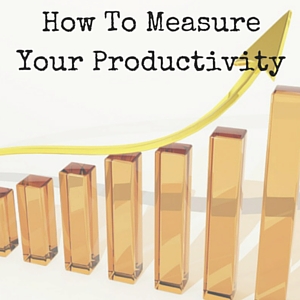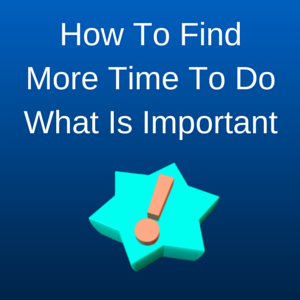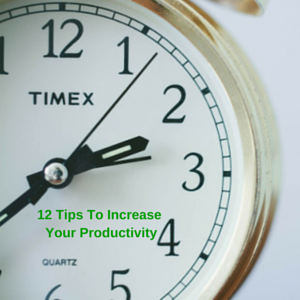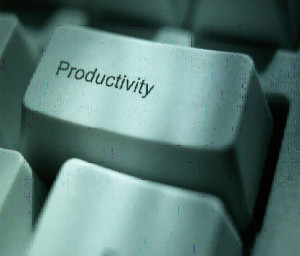
We all have goals. Some of those goals require what would appear to be monumental leaps while other goals don’t require much of a jump.
Regardless of what goals we pursue, we all understand the need to be productive. Better to get the same work done in 30 minutes than get the same work done in an hour.
That is the typical focus of productivity. Most people focus on getting a lot of stuff done and then getting that stuff done as quickly as possible.
If only that was how productivity actually worked.
Productivity isn’t a matter of hours worked and how much stuff you can say you did. The central focus of productivity is what work you are actually doing. Then the traditional methods of viewing productivity come in.
Is The Work You Do Productive?
Let’s say that in a month, I can create a thousand outlines for different blog post ideas this month or I can create four training courses that are each two hours long.
Even if both of those activities took up the same amount of my time, I would feel more productive creating the four training courses than doing 1,000 blog post outlines.
The problem with creating too many outlines is that the niche I am in constantly changes (if a new social network comes out, I have to write about it. Maybe Facebook ads changed again). And quite frankly, I could look at an outline upon second glance and realize it’s not a good blog post for me to write.
And being presented with 1,000 blog post outlines and having to choose one of them would be overwhelming. I won’t feel any better when I have to choose one blog post outline out of the 999 outlines that would be left.
However, creating four training courses would make me feel productive. I would provide more videos for my Udemy students and generate more revenue at the same time.
On the surface, writing 1,000 blog post outlines may look more productive than creating four training courses. This is another example that emphasizes the battle between busy work and productive work.
Creating an outline before you write a blog post allows you to write that blog post faster. However, at a certain point, creating the outlines just becomes busy work.
It is no longer productive because you aren’t writing the actual blog posts when you create the outline. Eventually, you have to look at one of those outlines and decide to turn that outline into a blog post.
Just because you do something does not mean you are being productive. If you wanted me to tell you all of the productive things I did in a given day, I wouldn’t rattle off everything I did on that day. I wouldn’t mention the fact that I put my clothing away or that I washed my dishes.
I would mention the number of blog posts I wrote and the number of videos I created.
Give Yourself A Hyper-Specific Definition Of Productivity
I’m not going to lie. Hyper-specific sounds way better than plain old specific.
We know there is a difference between busy work and productive work. What you may not know is how that difference applies to your life. What is the busy work that takes you away from your productive work?
You may be surprised to hear two things. Most of the work you currently do is probably busy work. The second thing you’d be surprised to hear is that answering the previous question is one of the easier questions of productivity to answer.
To identify the difference between busy work and productive work, you have to envision yourself in the “entrepreneur’s perfect world”. For sake of argument, here’s what that world looks like:
- You are a billionaire
- You make money on autopilot
- You have a team of 100,000 people working for you free of charge
- This team can do anything you ask them to do
Basically, you could retire right now and still make more money in one day than everyone else makes in a year. You are that 1%.
So what work would you still do?
When I asked myself this question, I came up with a small list of tasks that I would actually do for my business. Writing blog posts and creating videos were the two tasks that were on the top of the list.
My definition of productivity got very specific very fast. A few other things made it on the list too. But all of the tasks that did not make the list were distractions.
Scheduling social media posts, creating pictures for my blog posts, scheduling my blog posts, and growing my social media audience are four of several tasks that I suddenly viewed as distractions.
Distractions sap away at our true productivity, even if those distractions may be necessary for the growth and survival of our businesses.
Rise And Grind
In his book Power Of Broke, Daymond John shares several of his core beliefs that played a large role in his entrepreneurial success. One of the first things he mentioned is that when he wakes up, the first thing that enters his mind is “Rise and Grind.”
It simply means putting in the work every single day with as much intensity as you can muster.
We have already established that hours worked and stuff done are not the most reliable places to look when measuring productivity. However, productivity is also about consistency.
Consistency turns the work into an effortless habit that you can then constantly improve upon. Writing these blog posts is effortless for me because I have written thousands of blog posts on various blogs to reach this point.
When you rise and grind every day, you will eventually find yourself comfortable with putting in more work each day than most people would want to do in a week. Combine that with doing work that matters, and you’ll be a productivity master in no time.
Soon enough you’ll have to write your own blog posts about productivity 🙂
In Conclusion
Productivity is not measured by hours worked and amount of stuff done. It is measured by the type of work that you do, how much meaningful work gets done, your time commitment towards the work, and your consistency.
This blog post was designed to challenge the traditional thinking of productivity. Being busy and being productive are two completely different things.
However, being productive and truly being productive are also two different things.
For a long time, I thought I was being productive when I scheduled my tweets. It turns out during that stretch I was productive, but I wasn’t truly productive.
For me, truly productive means writing blog posts and creating videos.
What does truly productive mean for you? How do you measure your productivity? Are there any other questions about productivity you want answered? Have a tip for us? Sound off in the comments section below.

 Your productivity is one of the factors that determines how much you accomplish in your lifetime. The most productive people are the ones who get the celebrity status, the full-time income, and exert the most influence on our culture. The most successful people throughout history have shown the ability to be productive, and many of these people have shown a desire to be more productive than they already were. Productivity is a core element of success, and these 12 tips will help you increase your productivity so that core element of success can be strengthened in your own life.
Your productivity is one of the factors that determines how much you accomplish in your lifetime. The most productive people are the ones who get the celebrity status, the full-time income, and exert the most influence on our culture. The most successful people throughout history have shown the ability to be productive, and many of these people have shown a desire to be more productive than they already were. Productivity is a core element of success, and these 12 tips will help you increase your productivity so that core element of success can be strengthened in your own life.

